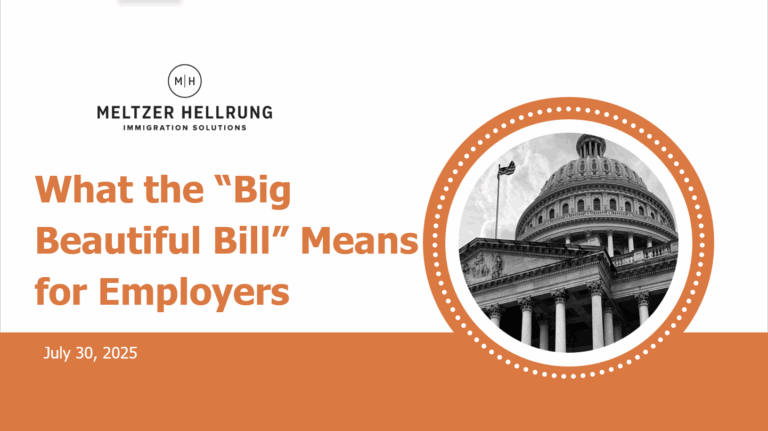The Issue
The Federal Budget Reconciliation Bill (a/k/a “the Big Beautiful Bill”) signed into law by President Trump contains unprecedented increases in funding for immigration enforcement and imposes significant new fees for immigration benefit requests. The new fees are effective immediately, although the Departments of Homeland Security and State are still in the process of implementing formal guidance on how and when the fees will be collected.
A Deeper Dive
Funding Increases:
The Bill provides a total of approximately $178 Billion in funding for immigration enforcement, which includes $46.5 billion for border wall construction, $45 billion to expand immigration detention capacity and approximately $30 billion for hiring and training investigators as well as for buying related resources for U.S. Immigration and Customs Enforcement. The cumulative effect of these record-level funding increases will enable the Department of Homeland Security not only to deter undocumented migration to the U.S. but also to immensely enhance its capabilities to investigate, arrest and detain individuals living and working in the U.S. without authorization.
New Fees:
- Border and Visa Processing. The Bill increases the Electronic System for Travel Authorization (ESTA) fee to $40, imposes a $24 fee for applying for a Form I-94 from Customs and Border Protection and establishes a $250 “Visa Integrity Fee” for nonimmigrant visas. While the details of how and when the Visa Integrity Fee will be collected have not yet been disclosed, we believe it will be payable for each visa issued, including visas to all accompanying family members, and will be collected at U.S consulates abroad after the consular officer has decided to issue the visa. It is likely that the ESTA and Form I-94 fees will be collected in accordance with existing procedures.
- Asylum Applications. Implements a new $100 asylum fee and adds a fee of $550 for initial work authorization applications and $275 for renewals. The legislation also created an annual asylum fee of at least $100 for pending asylum applications.
- Humanitarian Parole and Temporary Protected Status (TPS). Several categories of individuals eligible for parole into the country are now required to pay $1,000 to apply for humanitarian parole and must also pay an additional $550 to request initial work authorization ($275 for renewals). Applicants for adjustment of status who have obtained Advance Parole travel authorization are not required to pay these fees. For TPS, the Bill adds a fee of $500 to register for TPS and a $550 for requesting initial work authorization ($275 for renewals).
What This Means for Employers
Employers who reimburse employees for the cost of nonimmigrant visa applications should consider the impact of the Visa Integrity Fee on their corporate immigration budget for 2026 as, for example, the fee will add $1,000 in expenses to H-1B and H-4 visa applications for a family of four.
The massive increase in funding for immigration enforcement will enable agencies like Immigration and Customs Enforcement (ICE) to conduct significantly more Form I-9 audits and investigations, as well as targeted worksite enforcement activities, with a likely focus on industries such as agriculture, construction, food processing, hospitality, retail, and manufacturing. At a minimum, this increased enforcement could result in disruption of business operations of impacted employers as ICE audits are conducted. In the event undocumented workers are identified in an employer’s workforce, it could have a major impact on business continuity as, in addition to the sudden loss of workers, employers may be subject to both civil and criminal liability.
Recommendations:
- Review Immigration Compliance: Employers should conduct an audit of their immigration compliance practices, including recruiting and hiring processes, Forms I-9 and E-Verify procedures if relevant.
- Develop an Action Plan: Employers should have a thoroughly documented action plan for how to respond to potential ICE worksite enforcement actions, from instructing reception staff on company protocols if ICE agents appear at the workplace to training employees on their rights in a worksite enforcement action.
- Retain Legal Counsel: Employers should retain experienced immigration attorneys to ensure they have immediate access to competent counsel who can represent them before ICE in the event of an enforcement action.
- Stay Informed: Employers should stay informed about the latest developments in enforcement policies and seek advice from experienced immigration counsel.
Should you have any questions or wish to discuss your company’s immigration compliance plan in greater detail, please contact your Meltzer Hellrung attorney.
